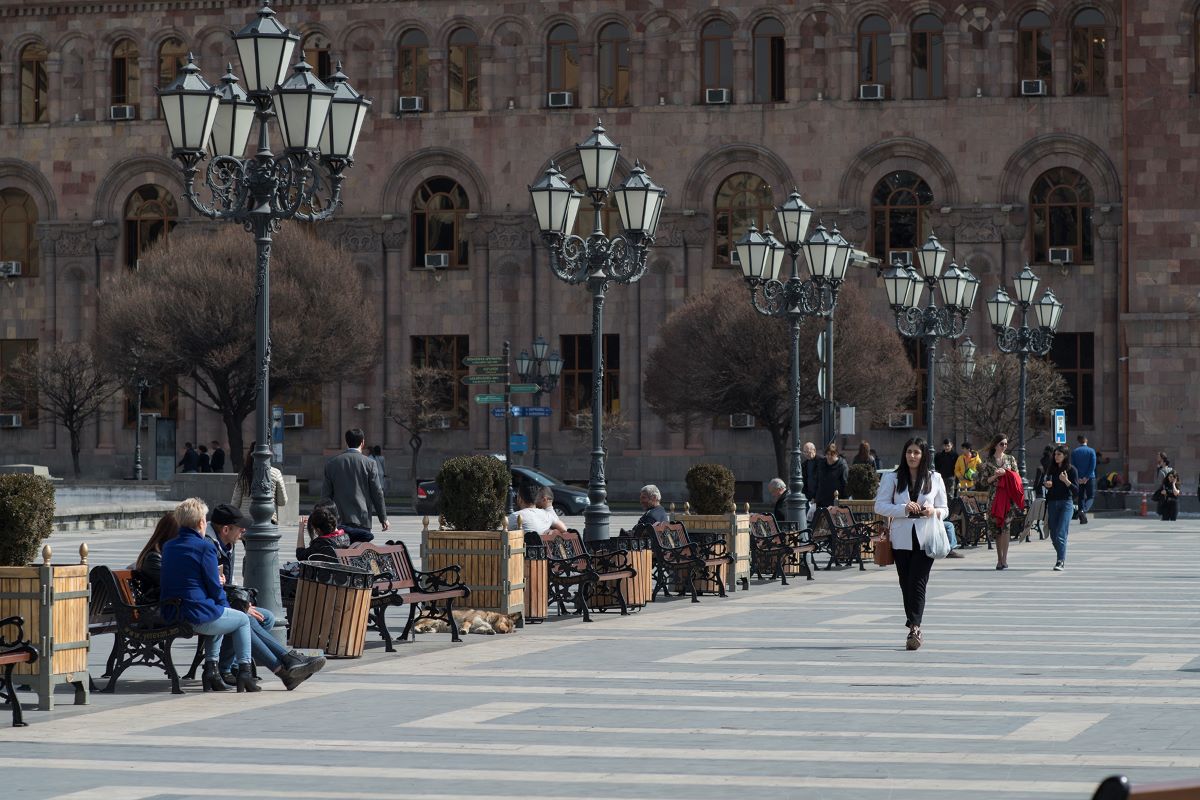
Reducing workday in Armenia to 7 hours
“Reduce the working day from 8 to 7 hours, and the weekly working hours from 40 to 35, while maintaining the salary.” This proposal was made by the Ministry of Labour and Social Affairs of Armenia. The draft law has, as usual, been published in advance on the e-draft.am platform for public discussion and expert review. It has already received 645 votes in favour, with 19 votes against.
According to the authors of the project, reducing working hours will not have a negative impact on the economy. On the contrary, it will contribute to increased productivity. However, according to Gagik Makaryan, a member of the Employers’ Union, labour productivity in the country is already low. It is several times behind European standards. Therefore, he believes that if the project is adopted, productivity will decline even further.
Economist Agasi Tavadyan told JAMnews that the ministry’s proposal is underdeveloped and not thoroughly thought through. In his assessment, it is a populist move, as the project lacks economic justification.
“Of course, it is stated that this step will contribute to increased productivity, but no relevant calculations are provided. It has not been calculated how this will impact the economy, organizational productivity, and the country’s income as a whole,” he stressed.
- Armenia’s exports to UAE increased, to Russia decreased: reasons explained
- Economic growth in Armenia: War in Ukraine and re-export due to sanctions. Opinion from Yerevan
- Fewer companies, more major taxpayers: The IT sector in Armenia
Work-life balance: proposal will ensure healthy balance between work and personal life
The Ministry of Labour and Social Affairs proposes amendments to the Labour Code to reduce the working day by one hour.
“Since the introduction of the current 8-hour working day, technological changes have occurred, contributing to the automation of many processes. Considering this, in various countries, such as France, Germany, Sweden, Belgium, Austria, Norway, and Iceland, a flexible working hours system has already been implemented, reducing working hours,” states the justification for the project.
The reduction of working hours is implemented differently in various countries. In some countries, the length of the working day is shortened, while in others, the number of working days per week is reduced:
“International experience and individual studies show that reducing weekly working hours does not have a negative impact on the economy. Moreover, it contributes to increased productivity and positively affects the quality of life, as it ensures a balance between work and personal life (work-life balance).”
In the project justification, the authors also refer to a study by the World Health Organization, which states:
“Long working hours affect mental and physical health, may cause cardiovascular diseases, and contribute to the development of depression and stress.”
Economic studies (EPI Report on Reduced Workweek) indicate that reducing working hours can:
- Increase labour productivity through more efficient employee work,
- Create new jobs amid the overall economic trend.
“We’re just trying to appease people”
Gagik Makaryan, a member of the Employers’ Union, does not share the view of the Ministry of Labour and Social Affairs. He believes that this proposal carries risks for the economy:
“Armenia’s economy has serious problems with competitiveness. For economic development, we need to make significant efforts and mobilize our resources. Working hours play an important role in this.”
He says that some countries were able to switch to a 7-hour working day only because they have high productivity, highly skilled employees who work quickly, and good technology. According to Makaryan, annual productivity per person in Europe is 110-130 thousand dollars, whereas in Armenia, this figure is about 8 times lower.
The economist does not understand what problem the government intends to solve with this change:
“Perhaps we are solving a social issue or one related to healthcare. Or maybe we are just trying to appease people.”
He believes that the level of automation in Armenia is low. He emphasizes that, aside from equipment, labour force plays a significant role in productivity. In Makaryan’s opinion, the quality of the workforce has not improved:
“The education system still cannot provide the necessary quantity or quality of personnel. How can productivity increase if the same people are working? Does this mean the government acknowledges that the workforce is tired? Will they work more enthusiastically and actively if the workday is shorter?”
According to the member of the Employers’ Union, the workforce is uncompetitive, so working fewer hours will not increase the GDP they produce. He is concerned that the country will not reach the required level of economic development. In that case, the government will try to generate income and maintain promised salaries “at the expense of businesses.”
“Since businesses are obligated to use less labour, they will not generate the same level of income. Overall business productivity will decrease. This means that VAT and profit taxes will also decrease,” he noted.
Economist Agasi Tavadyan
Economist Agasi Tavadyan says that those who can work remotely have benefited from process automation. This includes a large number of people working in IT and related fields. He emphasizes, however, that this is not the case for everyone. There are areas of work where physical presence is important, and therefore, productivity may decrease.
He gives the example of doctors, who must provide 24-hour shifts. Previously, three doctors were needed for this. After the expected changes, the question will arise—how will the work be organized? In his view, the project does not take into account the specifics of people’s work schedules:
“For example, some people work one day for 24 hours and then rest for two days. How will their situation be addressed?”
According to Tavadyan, business owners should decide what working hours to establish for specific positions, and the government should not interfere.
He is certain that there are no economic calculations, calling it a “populist move.” Only with calculations and the results of their analysis does he see grounds for a clear answer to the question of what this will bring to the economy.
Tavadyan asserts that this is not the first populist initiative from the government. Previously, it made a decision regarding unreliable borrowers. He believes such decisions should be viewed in the context of an election campaign.
In his opinion, Armenia’s economy already faces enough problems. He reminds that the tax burden has increased, and between January and September 2024, exports to the EAEU and the European Union decreased by 17% and 25%, respectively. Moreover, in the last quarter, state revenues decreased. Tax revenues were 8% lower than planned.
“In these conditions, this decision will be an additional burden on the business entities that sustain our economy. The state has insured workers, but employers face significant risks,” he concluded.
Social media reaction
“I welcome this proposal. I believe it is important to note that in many member countries of the International Labour Organization, a 4-day working regime is now in place, allowing employees to spend the remaining days of the week with their families.”
“Instead of creating jobs, you are reducing working hours while keeping the salary. Is our situation really that good? Or are the newly appointed officials unable to work? Will they at least pretend to work for one hour less?”
“An excellent initiative, justified by the fact that in such a stressful atmosphere, an additional hour for more pleasant activities will contribute both to health and greater social activity. People will also have more time to spend with their families and children.”
“I ask that the law be passed with provisions that apply to everyone. I work in a private institution myself, and I want my employer to be obligated to comply with this law and not be able to circumvent it in any way. I hope the initiative will be implemented and the rights of many thousands of workers will be protected.”




